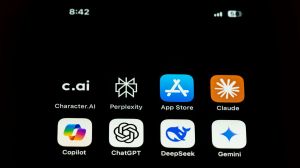Top of the mind: Joining the Dots
Guess what? We may be smarter than we had thought.
Do you have these moments of doubt,and that too alarmingly often? That you are flailing in a perpetual state of distractedness,unable to mindfully focus on a single narrative in the course of an ordinary day? That you cannot attack a task whether with a deadline ticking at your workplace or in the quiet of a well-deserved hour off without breaking off to check your mail,call a friend,scan the ticker feed on TV news,snatch a few minutes to finish reading that op-ed you had put aside earlier in the day,check Twitter for the latest spark in the culture wars,turn the page of a crime novel,send a text message to someone (anyone!) to share an absolutely stray thought because you have lost the capacity to let stray thoughts be? In fact,that it is not even that you are breaking off deliberately? That,worse,without doing so,you cannot concentrate on the project at hand? That in the solitude of no connectivity whether Internet or just mobile phone you feel too unsettled to be able to truly relax and recharge? And that,as a consequence,there is something inauthentic or at the very least,insufficiently substantive about you?
In recent years,cautions about the wages of this constant distractedness,of the morphing of our brains as a result of net connectivity and seductions of hyperlinks,have flooded the bookshelves. The most feisty and widely quoted was Nicholas Carrs
The Shallows a couple of years ago,the name betraying what he thought about how the need to be constantly connected was transforming our brains.
The title of a new book by Clive Thompson,an American journalist,too leaves no doubt on where he stands on this debate: Smarter Than You Think: How Technology is Changing our Minds for the Better. It is a persuasive account,and not just because it appears to validate as useful our wired existence,removing thereby the guilt we constantly experience that we are being less than true in failing to give our unqualified attention to one task,one conversation,one printed passage at a time.
He encourages the reader towards the extended mind theory,the argument that the reason humans are so intellectually dominant is that weve always outsourced bits of cognition,using tools to scaffold our thinking into ever-more-rarefied realms. Today digital aids are just a new development in a long history of using technology to externalize our thoughts,starting with inexpensive paper and pens. He gives the example of physicist Richard Feynman. When a historian friend hailed his notebooks as a record of his day-to-day work,Feynman disagreed with the phrase. They werent a record of his thinking process. They were his thinking process. Said Feynman: Its not a record,not really. Its working. You have to work on paper,and this is the paper. Okay?
Its part of a long evolution,says Thompson: Each time were faced with bewildering new thinking tools,we panic then quickly set about deducing how they can be used to help us work,meditate,and create.
Since the contest between human and computer is seen to be,in the popular imagination,best settled by a game of chess,Thompsons recap is particularly interesting. To cut a detailed record of different fixtures short,guess which is smarter,human or computer? Its not one or the other. Its the two together,working side by side. In fact,the better chess player in a person-to-person match may lose to a much lower ranked one more adept at using digital tools.
But these are examples of purposeful collaborations,as it were,between human and technology of using infinite memory,dot connecting,explosive publishing (the three main benefits of todays digital tools cited by Thompson) to solve equations,to make connections for theoretical and creative breakthroughs,to win a game of chess. What of our status-update trivia,sent out on phone messages or posted on social media,shallow communications on what we are eating,watching,reading,thinking? How useful can that be?
Plenty,argues Thompson. See it as ambient awareness,deepening our sense of the space around us. Before modern technology no friend would bother to call you up daily and detail the sandwiches she was eating,the articles shed read,or the miles shed walked today; indeed,if she did youd have found it annoying and intrusive. And like dots forming on a pointillist painting,every separate bit of seemingly pointless information adds to an ambient awareness of your friends inner life. And outside of your intimate circle or group,ambient awareness enables collaborations not just in terms of logistics and mobilisation,but also in seizing on ideas and agendas and taking them forward,or,indeed,in gaining a recognition of the possibility of new ideas.
So,go ahead,shed the guilt. At least till the next take on the effects of digital technology comes your way.
mini.kapoorexpressindia.com
- 01
- 02
- 03
- 04
- 05































